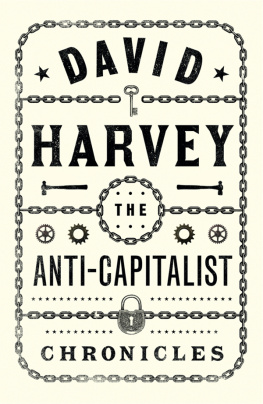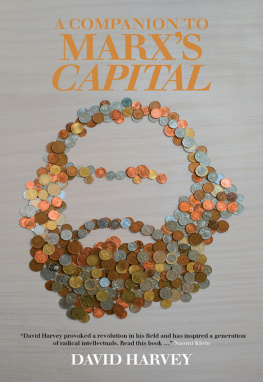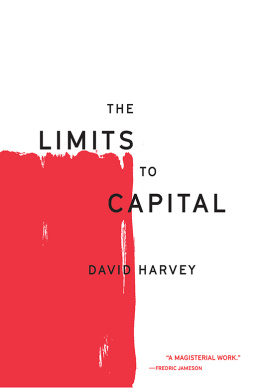Harvey David - The Anti-Capitalist Chronicles
Here you can read online Harvey David - The Anti-Capitalist Chronicles full text of the book (entire story) in english for free. Download pdf and epub, get meaning, cover and reviews about this ebook. publisher: Pluto Press, genre: Politics. Description of the work, (preface) as well as reviews are available. Best literature library LitArk.com created for fans of good reading and offers a wide selection of genres:
Romance novel
Science fiction
Adventure
Detective
Science
History
Home and family
Prose
Art
Politics
Computer
Non-fiction
Religion
Business
Children
Humor
Choose a favorite category and find really read worthwhile books. Enjoy immersion in the world of imagination, feel the emotions of the characters or learn something new for yourself, make an fascinating discovery.
- Book:The Anti-Capitalist Chronicles
- Author:
- Publisher:Pluto Press
- Genre:
- Rating:4 / 5
- Favourites:Add to favourites
- Your mark:
- 80
- 1
- 2
- 3
- 4
- 5
The Anti-Capitalist Chronicles: summary, description and annotation
We offer to read an annotation, description, summary or preface (depends on what the author of the book "The Anti-Capitalist Chronicles" wrote himself). If you haven't found the necessary information about the book — write in the comments, we will try to find it.
The Anti-Capitalist Chronicles — read online for free the complete book (whole text) full work
Below is the text of the book, divided by pages. System saving the place of the last page read, allows you to conveniently read the book "The Anti-Capitalist Chronicles" online for free, without having to search again every time where you left off. Put a bookmark, and you can go to the page where you finished reading at any time.
Font size:
Interval:
Bookmark:

The Anti-Capitalist Chronicles
Chief Editor
Jordan T. Camp (Visiting Scholar, Center for Place, Culture and Politics, City University of New York, Graduate Center; Co-Director, Racial Capitalism Working Group in the Center for Social Difference at Columbia University)
Editorial Board
Christina Heatherton (Assistant Professor, American Studies, Barnard College; Co-Director, Racial Capitalism Working Group in the Center for Social Difference at Columbia University)
Manu Karuka (Assistant Professor, American Studies, Barnard College; Co-Director, Racial Capitalism Working Group in the Center for Social Difference at Columbia University)
Advisory Board
Elisabeth Armstrong (Professor, Program for the Study of Women & Gender, Smith College)
Claudia de la Cruz (Executive Director, The Peoples Forum)
Jodi Dean (Professor, Political Science, Hobart and William Smith Colleges)
Roxanne Dunbar-Ortiz (Professor Emerita, Department of Ethnic Studies, California State University, Hayward)
Kanishka Goonewardena (Associate Professor, Department of Geography and Planning, University of Toronto)
Gerald Horne (Moores Professor of History and African American Studies, University of Houston)
Gary Y. Okihiro (Professor Emeritus of International and Public Affairs, Columbia University)
Vijay Prashad (Director, Tricontinental: Institute for Social Research)
The Red Letter series is developed in and launched from The Peoples Forum, a movement incubator and educational space in New York City. It features innovative studies in the history of capitalism, imperialism, social movements, and social theory. Red Letter books link engaged scholarly production and radical working-class movements in North America from an internationalist perspective. Inspired by Antonio Gramsci, Red Letter works with authors who are committed to advancing the struggles of the poor, working class, the unemployed, and the dispossessed, the new intellectuals of our time.
David Harvey
Edited by Jordan T. Camp and Chris Caruso

First published 2020 by Pluto Press
345 Archway Road, London N6 5AA
www.plutobooks.com
Copyright David Harvey 2020
The right of David Harvey to be identified as the author of this work has been asserted in accordance with the Copyright, Designs and Patents Act 1988.
British Library Cataloguing in Publication Data
A catalogue record for this book is available from the British Library
ISBN 978 0 7453 4208 5 Hardback
ISBN 978 0 7453 4209 2 Paperback
ISBN 978 1 7868 0774 8 PDF eBook
ISBN 978 1 7868 0776 2 Kindle eBook
ISBN 978 1 7868 0775 5 EPUB eBook
This book is printed on paper suitable for recycling and made from fully managed and sustained forest sources. Logging, pulping and manufacturing processes are expected to conform to the environmental standards of the country of origin.
Typeset by Stanford DTP Services, Northampton, England
Simultaneously printed in the United Kingdom and United States of America
Jordan T. Camp
Jordan T. Camp and Chris Caruso
David Harvey
Jordan T. Camp
With The Anti-Capitalist Chronicles, my co-editors, Christina Heatherton and Manu Karuka, and I are immensely proud to launch our Red Letter book series. Red Letter features works by intellectuals invested in the struggles of the poor, working class, and dispossessed in North America from an internationalist perspective. Inspired by Antonio Gramsci, we publish works by emerging radical intellectuals, authors, scholars, and permanent persuaders of political and social movements. Amidst a surging interest in socialism, our books are intended as resources for popular education in working-class and socialist movements, as well as for classroom adoption. Our goal is to place anti-imperialism and class struggle at the heart of the political and intellectual agenda.
The Anti-Capitalist Chronicles was conceived as an intervention in debates around the crisis of neoliberal capitalism and the renewal of the socialist left. It was developed through discussions at The Peoples Forum, a movement incubator and educational and cultural space in New York City. In this endeavor we have been fortunate to interact with political and social movements across the United States and Global South including the Landless Workers Movement (MST) in Brazil; South Africas Abahlali baseMjondolo, the shack-dwellers movement and the National Union of Metalworkers South Africa (NUMSA); and the Poor Peoples Campaign, Fight for $15, anti-war movements in North America, and many more. In these struggles, we see new visions for fundamental social change arising. We are immensely proud to work in collaboration with some of the foremost Marxist scholars in the United States and in the world, namely, David Harvey.
Few possess the clarity and foresight of world-renowned Marxist theorist, David Harvey. Since the publication of his bestselling A Brief History of Neoliberalism (2005), Harvey has been tracking the evolution of the neoliberal capitalism as well as tides of radical opposition rising against it. Now, amidst waves of economic crisis, class struggle, and neo-fascist reaction, Harvey defines how socialist alternatives to capitalism are possible, and elucidates how the transition to socialism can and must be organized by the movements. The Anti-Capitalist Chronicles represents Harveys reflections on crisis and possibility, an update and clear-eyed assessment of the intervening years since A Brief History of Neoliberalism was first published.
While some works declare neoliberalism dead, The Anti-Capitalist Chronicles contends that the neoliberal project is very much alive, but, significantly, with its legitimacy lost. Neoliberalism, unable to command the consent it once did, has developed alliances with neo-fascism in order to survive. The rise of nationalist and violent reactionary forces is therefore not ancillary or accidental to the survival of capitalism; as Harvey argues, such violence has been present since its bloody inception.
Then, as now, the rise of the neoliberal state is inconceivable outside of class struggles across the US and the world. In the 1960s
In this period, as A Brief History of Neoliberalism describes, the interests of the ruling class were shown to be disconnected from the interests of the masses. Increased expenditures on warfare and militarism, such as mass incarceration and policing, contributed to neoliberalisms legitimacy crisis. In order to resolve this crisis, capitalist states promoted authoritarian politics and free market solutions. It is from these efforts that we can mark the neoliberal turn. This global neoliberal counterrevolution, we should remember, was the product of political and class struggles; ones that could have had, and that still could have, different outcomes.
The development of the neoliberal state has been accompanied by the production of a historically specific common sense. Harvey employs the concept of common sense as Italian Marxist theorist Antonio Gramsci did, to describe the generally held assumptions and beliefs that secure consent to coercion.
Neoliberal common sense has circulated for decades through the media, universities, and think tanks. In opposition to it, anti-capitalist movements across Africa, Asia, the Americas, and Europe have drawn on Harveys theoretical work to counter its circulation. These mass movements of the left, as well as cycles of protests against austerity from Chile to Lebanon to Haiti, reveal that neoliberalism is no longer able to secure the consent of the masses. The current state of affairs represents what Gramsci referred to as a crisis of authority or a moment where the ruling class has lost its consensus, i.e. is no longer leading but only dominant, exercising coercive force alone, and therefore this means that the great masses have become detached from the traditional ideologies, and no longer believe what they used to. Such a moment is unpredictable, but it offers a unique opportunity for activists and forces of opposition to organize.
Font size:
Interval:
Bookmark:
Similar books «The Anti-Capitalist Chronicles»
Look at similar books to The Anti-Capitalist Chronicles. We have selected literature similar in name and meaning in the hope of providing readers with more options to find new, interesting, not yet read works.
Discussion, reviews of the book The Anti-Capitalist Chronicles and just readers' own opinions. Leave your comments, write what you think about the work, its meaning or the main characters. Specify what exactly you liked and what you didn't like, and why you think so.











